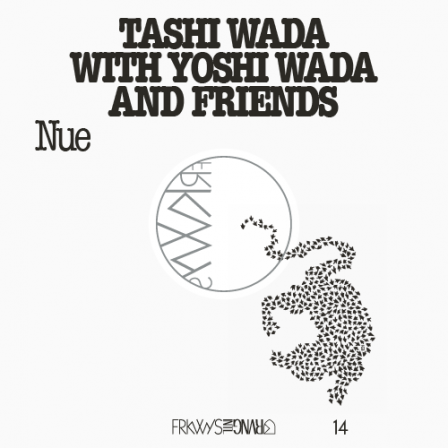Yoshi Wada’s music typically unspools in hyper slow motion. His most monumental works — the ones that cast him, alongside La Monte Young, as one of the preeminent drone pioneers of the mid-20th century — are durational masterpieces that flirt with the eternal and explore the complexities of resonance in groundbreaking ways. His son, Tashi Wada, has picked up the latter element of his father’s music and expounded on it in various contexts. His compositions are often focused on exploring relationships between individual tones and accentuating how seemingly simple elements can contain multitudes. The minute details of how each sound or pitch interacts with others are at the center of how both generations of Wadas compose. On Nue, their first recorded full-length collaboration after years of performing together live, Tashi and Yoshi add another layer of relational exploration: one between themselves and their collaborators. Bringing in a collection of contemporary musicians from Julia Holter to Corey Fogel, they have expanded the scope of their work, but in doing so have lost some of the nuance that has made their music vital.
Music constructed to explore the subtle intricacies of sound works best when listeners are allowed to stay inside that world for extended periods of time. Slow development allows for a dramatic arc that mirrors the refinement of the ideas being presented, a concept Yoshi Wada took to ingenious extremes in works like Earth Horns With Electronic Drone. But on Nue, Tashi and the ensemble present ideas, many of which merit much greater extrapolation, but let them dissipate before they seem fully developed. “Double Body” opens slowly with a sparse pulse of bass drum by accomplished percussionist Corey Fogel before being joined by a quiet synth drone by Julia Holter and a duet of arresting chanter (a bagpipe-related wind instrument) by Tashi and Yoshi. Each element is expertly placed, especially as Fogel adds a scattered rimshot to the mix, but the development feels rushed, as the chanters build to a climax of beautifully clustered tones within two minutes and drop off almost immediately after its reached. Similarly on “Mutable Signs,” Holter’s voice emerges out of murky synth patterns with a triumphant, dazzling melody that seems inspired by pre-baroque religious music, but it’s quickly subsumed by the electronics and the piece ends shortly thereafter.
[Visit full site to view media]FRKWYS Vol. 14 - Nue by Tashi Wada with Yoshi Wada and Friends
Despite these seemingly truncated tracks, there are several fully-formed compositions that work well on this smaller scale. “Ondine,” which draws its power from the stacking of voices and sirens, features Holter along with guest vocalists Simone Forti, Jessika Kenney, and Laura Steenberge. The piece is driven by the dissonance of close-proximity tones that begin with uncomfortable murmurs, growing into a chorus of shifting clusters that slide in and out of complex harmonic patterns. “Niagara,” the piece that directly follows it, also expresses a complete climactic arc, which relies heavily on Fogel’s expressive drumming in concert with a slowly-evolving synthesizer pattern dancing around a static, reedy drone. “Fanfare” sees Tashi channeling Terry Riley on the Prophet-6, running modal figures up and down, while Yoshi provides a bedrock bagpipe drone, showing a contrasting aspect of Tashi’s compositional skill that isn’t displayed elsewhere on the album.
There is an obvious synergy between Tashi and Yoshi Wada on Nue, and the father and son establish a dynamic that is more diverse and malleable than any of their prior recording work. They have also chosen their collaborators well, especially Fogel, whose rhythmic explorations provide color more than a steady rhythmic backbone. But the album doesn’t flow as a connected suite of compositions and lacks a distinctive centerpiece that can act as a gravitational center around which the less momentous compositions can revolve. The substantive musical ideas, of which there are plenty, by and large seem transient and unprobed, and their liberal use of fade-outs seems to suggest that these were originally longer compositions. Tashi and Yoshi Wada are singular musical thinkers, and Nue is certainly a worthwhile entry into their respective discographies, but deeper explorations of their ideas would have made it truly momentous rather than fleetingly tentative.
